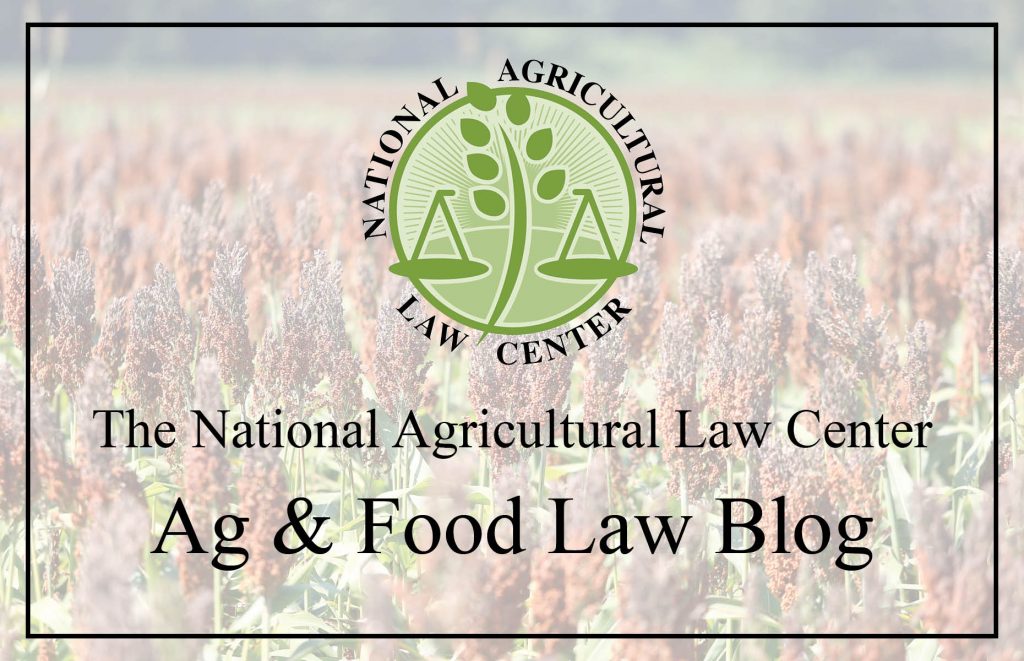October Round-Up
As October ends, researchers at the National Agricultural Law Center continue to bring trusted research and information in agricultural and food law to stakeholders across the country. Outlined below are all the new NALC resources from the month of October.
Publications
FIFRA: Steps to Pesticide Registration: All pesticides that will be sold or distributed in the United States must be registered with the Environmental Protection Agency (“EPA”) according to the Federal Insecticide, Fungicide, and Rodenticide Act (“FIFRA”). The registration process involves an evaluation of the required forms, proposed labeling, technical and scientific data, and a statement of how the registrant will comply with any data compensation requirements. This factsheet discusses the components of a pesticide registration, highlights labeling and usage requirements, and walks readers through the process itself.
Farm Bill Conservation Programs: Swampbuster and Sodbuster: When Congress enacted the 1985 Farm Bill, it included the Conservation Reserve Program, which was intended, in part, to conserve highly erodible land and wetlands. Colloquially known as the “Sodbuster” and “Swampbuster” provisions, they require farmers to 1) maintain a minimum level of conservation on highly erodible land, and 2) not convert wetlands for crop production, all in return for keeping certain United States Department of Agriculture (“USDA”) benefits. The goal of the conservation provisions is to encourage conservation priorities by reducing the availability of certain USDA benefits to those who make specific land-use decisions. This article provides an overview of both programs, including history, policy and programmatic requirements.
Industrial Hemp Production Contracts: Managing Expectations and Mitigating Loss: Contracts are a legally binding promise that provide certainty and stability in a global marketplace. Because industrial hemp production is relatively new in the United States, this growing industry has a faced a myriad of legal issues and one of them has been the lack of contracts specific to the industry. This factsheet considers various clauses that are common to production contracts for industrial hemp and discusses how they operate.
Produce Safety Rule Highlights: Under the Food Safety Modernization Act, FDA was tasked with creating science-based minimum standards to prevent contamination of produce on the farm. To achieve this goal, FDA issued the Produce Safety Rule which creates science-based minimum standards for the safe growing, harvesting, packing, and holding of fruits and vegetables grown for human consumption. The rule is intended to minimize the risk of serious illness from produce. This factsheet provides an overview of the major components of the rule and provides links to detailed guidance documents provided by FDA.
Webinars
Opening a Craft Beer Brewery: Laws & Considerations: Our last webinar, hosted October 21, discussed the legal landscape for craft beer breweries. Craft beer is a growing market across the United States. According to the Brewers Association, the craft beer market made $29.3 billion in sales in 2019, a 6% growth from the previous year. Although the new market is exciting, it can be difficult to navigate legally. In this webinar, Candace L. Moon, owner and partner of The Craft Beer Attorney, will discuss the legal considerations for opening a craft brewery and how entrepreneurs and attorneys can navigate them. Find a recording of this webinar here.
Blog posts:
- Deconstructing the CWA: What is a TMDL?
- All American: ‘Made in the USA’ Labeling Proposed Rule Faces Scrutiny
- Rule Changes Alters Farm Service Agency Programs Eligibility an Payment Limits
- Lending for Livestock, Credit for Crops: The Basics of Secured Transactions
- Water Rights Dispute: Public Trust Doctrine in Front of NV Supreme Court
- Lettuce Keep it Clean: Efforts to Reduce Leafy Green Contamination
- Stuck in the Swamp? Overview of the Minimal Effect Exemption Under Swampbuster
- Lending for Livestock, Credit for Crops: Attaching the Security Interest
- The Deal with Dicamba: EPA Approves Dicamba Pesticides for 2021 and Beyond
Outreach
- Senior Staff Attorney Rusty Rumley provided background information on ranch transition planning for a story in Santa Gertrudis USA.
